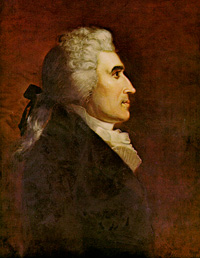Jonathan Dayton
| Jonathan Dayton | |
|---|---|
 |
|
| 3rd Speaker of the United States House of Representatives | |
|
In office December 7, 1795 – March 4, 1799 |
|
| President |
George Washington John Adams |
| Preceded by | Frederick Muhlenberg |
| Succeeded by | Theodore Sedgwick |
| Member of the U.S. House of Representatives from New Jersey's At-large district |
|
|
In office March 4, 1791 – March 4, 1799 |
|
| Preceded by |
James Schureman Elias Boudinot |
| Succeeded by |
Mark Thomson John Condit |
|
United States Senator from New Jersey |
|
|
In office March 4, 1799 – March 4, 1805 |
|
| Preceded by | |
| Succeeded by | Aaron Kitchell |
| Member of the New Jersey General Assembly | |
|
In office 1786–1787 1790 |
|
| Member of the New Jersey Senate | |
|
In office 1789 |
|
| Personal details | |
| Born |
October 16, 1760 Elizabethtown, New Jersey |
| Died | October 9, 1824 (aged 63) Elizabethtown, New Jersey |
| Political party | Pro-Administration Federalist |
| Spouse(s) | Susan Williamson |
| Alma mater | College of New Jersey |
| Profession | Law |
| Religion | Episcopalian |
Jonathan Dayton (October 16, 1760 – October 9, 1824) was an American politician from the U.S. state of New Jersey. He was the youngest person to sign the United States Constitution and a member of the U.S. House of Representatives, serving as the third Speaker of the United States House of Representatives, and later in the U.S. Senate. Dayton was arrested in 1807 for treason in connection with Aaron Burr's conspiracy; Dayton was never tried, but his national political career never recovered.
Dayton was born in Elizabethtown (now known as Elizabeth) in New Jersey. He was the son of Elias Dayton, a merchant who was prominent in local politics and had served as a militia officer in the French and Indian War. He graduated from the local academy, run by Tapping Reeve and Francis Barber, where he was classmates with Alexander Hamilton. He then attended the College of New Jersey (now known as Princeton University). He left the College of New Jersey in 1775 to fight in the Revolution, though he would later receive an honorary degree in 1776.
Dayton was 15 at the outbreak of the Revolutionary War in 1775 and served under his father (Elias) in the 3rd New Jersey Regiment as an ensign. On January 1, 1777, he was commissioned a lieutenant and served as paymaster. He saw service under Washington, fighting in the battles of Brandywine Creek and Germantown. He remained with Washington at Valley Forge and helped push the British from their position in New Jersey into the safety of New York City. In October 1780, Dayton and an uncle were captured by loyalists, who held them captive for the winter before releasing them in the following year. Dayton again served under his father in the New Jersey Brigade. On March 30, 1780, at age 19, he was promoted to rank of captain and transferred to the 2nd New Jersey Regiment, where he took part in the Battle of Yorktown. The Revolutionary War pension records indicate that he served as Aid-de-Camp to General Sullivan on his expedition against the Indians from May 1 – November 30, 1779. On July 19, 1799, Dayton was offered a commission as Major General in the Provisional United States Army, but declined.
...
Wikipedia
